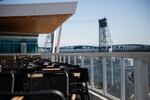Seven months into the COVID-19 pandemic, Vancouver city officials face another essential task made harder by the virus' economic strain: passing a budget.
Vancouver City Council on Monday night held the first of several public discussions around a new two-year budget, expected to be passed in November. The unpredictability of the virus and the federal response do not make it easy, city officials said.
“We like certainty when we’re making budgets,” Mayor Anne McEnerny-Ogle told OPB. “And there’s no certainty here.”
The budget proposed by City Manager Eric Holmes calls for $1.3 billion in total spending, including $479 million from the general fund, which helps pay for police, firefighters, parks staff and more.
But the pandemic is expected to cause a $13 million loss. While significant, that’s a much rosier outlook than the $27 million loss staff warned about back in June.
Holmes' proposal recommends freezing a score of jobs and drawing millions from a rainy-day fund. Still, some long-planned initiatives haven’t been scrapped.
“I can’t emphasize enough that we continue to be in an environment with significant uncertainty,” Holmes told City Council, noting the economic woes and a “stalemate” in Congress over renewed federal stimulus. On Tuesday, President Trump called for an end to negotiations over a stimulus package, throwing into doubt whether states would get relief funding before the election.
Vancouver will freeze 20 jobs that have been vacated. The jobs mostly are nonuniformed staff in the Vancouver Police Department and the city’s parks and recreation department.
The freeze would save about $4 million in the two-year budget cycle, meaning the city would go without those roles until 2022. Another $4 million is saved by trimming supplies and certain services, according to Chief Finance Officer Natasha Ramras.
To make up the remaining $5 million in the budget hole, the city plans to tap reserves, Ramras said. She added the city also plans to draw from reserves for new investments, bringing the total withdrawal to $13.7 million.
The pandemic’s budgetary damage has been mitigated, Ramras said, due to higher-than-expected tax revenue. The latest budget projections, for example, showed especially strong sales tax figures, a major general fund contributor.
People buying new cars or construction companies buying building materials in bulk pay a percentage to the city. That revenue makes up about one-third of the city’s general fund spending.

Seats sit empty during lunch hour at a restaurant at The Waterfront Vancouver, in Vancouver, Wash., on March 16. Governments projected to take a big hit a loss of sales taxes, but now say federal stimulus lessened the damage.
Troy Brynelson / OPB
In June, staff expected sales tax dollars to dive by 27%. Now, they project just a 6% dip. Ramras traced the change to the federal relief package passed by Congress in March.
“It’s highly likely we’re still seeing an economy with a large influx of federal funding support,” Ramras told Vancouver City Council on Monday night.
But Ramras underscored caution throughout her presentation. Unemployment benefits from the package expired in July, meaning economic effects could be just starting to emerge. Other major sources of revenue, like property taxes, may also be in flux.
“The economy so far is doing pretty well,” Ramras said. “We haven’t seen what the true impact on the economy is without the strong federal support.”
Still, Holmes' proposal would move forward with some new plans.
It recommends further funding the Homeless Assistance Response Team, which leads the city’s efforts with the unhoused. It calls for hiring a deputy city manager.
Related: Vancouver seeks to create needed shelter beds for homeless after bumpy start
The proposal also suggests hiring a director of diversity, equity and inclusion, whose job will be to help eliminate structural racism in city policies and practices, such as hiring.
“This person is going to have a tough job,” McEnerny-Ogle said in an interview. “They’re going to be working with council, working with employees, but they’re also going to help each of our 27 boards and commissions look at their work, look at their policies.”
The proposal also continues plans for $180 million in capital projects, like building a new fire station and planning a community hub at the city’s International District. It calls for fixing up some “high priority” city parks, as well.
Until COVID-19 hit, city officials hoped to pass “A Stronger Vancouver,” an omnibus of new taxes and fees to pay for new projects like more homeless services and parks. They shelved it in spring amid statewide lockdowns and mass layoffs.
Sarah Fox, a first-term councilor, noted many facets of the omnibus did not make it into the budget. After four years of community work, she said she expected officials will revisit it in piecemeal.
“I’m sure next year that will probably be back on our agenda, to figure out if we can move forward on some of these,” she said.
Vancouver plans to hold more work sessions on the budget proposal in October and early November. A first reading is slated for Nov. 9, followed by a public hearing Nov. 16.